Torshavn - Short Break (Faroe Islands)
Welcome to the capital of the Faroe Islands and the smallest capital city in the world, with a population of just 20,000.
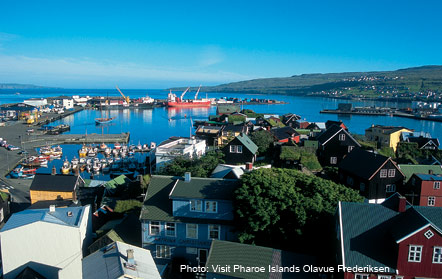
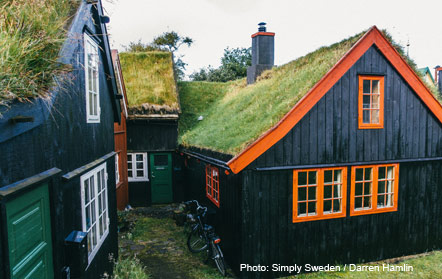
All our holidays are available without flights if you are travelling from outside the UK.
Just make your enquiry as normal and we will be able to tailor-make your enquiry.
Okay


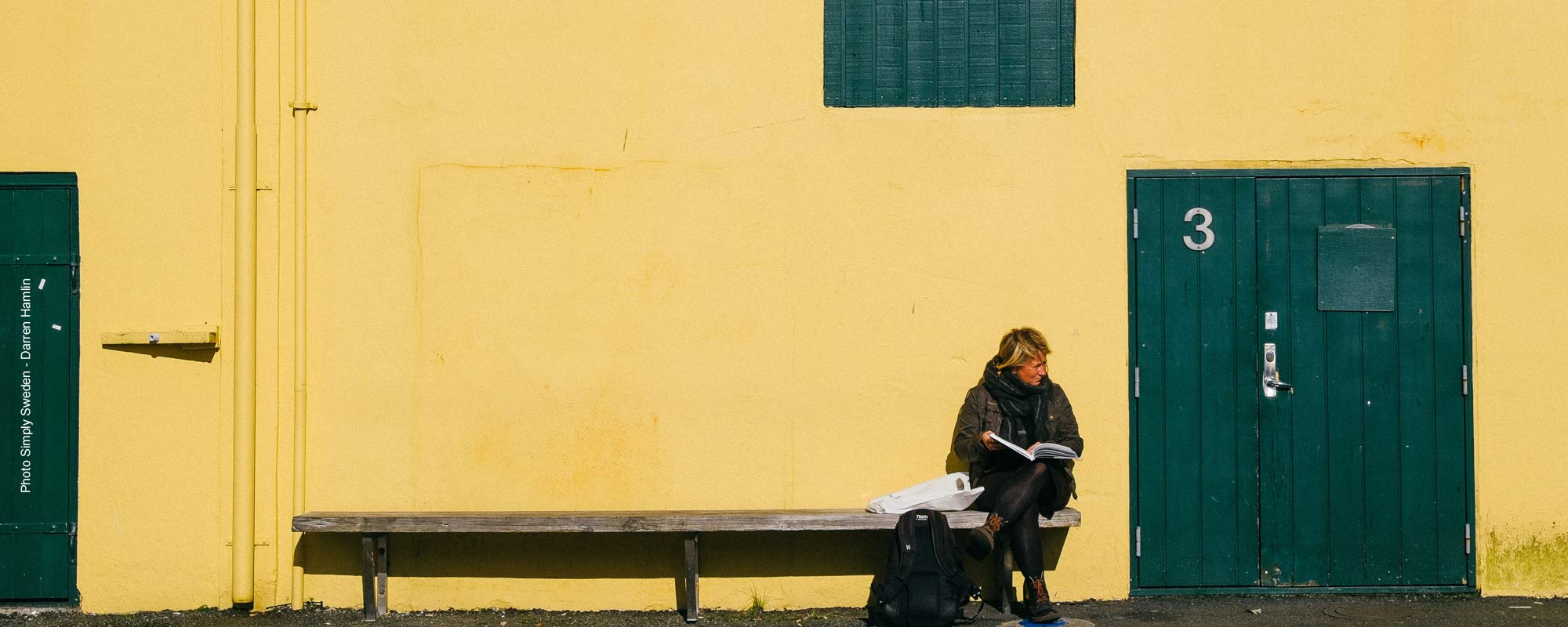
Welcome to the capital of the Faroe Islands and the smallest capital city in the world, with a population of just 20,000.


Welcome to the capital of the Faroe Islands and one of the smallest capital cities in the world, with a population of just 20,000. There are no crowds of people or international department stores; Torshavn is about small locally run businesses where you can buy fresh fish on the quayside or locally produced knitwear to keep you warm.
The literal translation of Torshavn is Thors Harbour (Thor being the Norse god of war) and originates from 900AD. Tinganes is the old town and home to the island's parliament. This ancient area now separates the two harbours and is a popular location for tourists.
There are free busses in the city so exploring is easy! Roads radiate out from Torshavn and the entire Faroe Islands can be explored with help from the efficient public transport network. The tourist office is located in the heart of Torshavn and is the place to locally source all the information you need for your visit.
The highlights of this holiday
The cosy culture of Torshavn, the food at Etika (recognised as one of the best sushi restaurants), the use of public transport to explore the islands (especially during the summer) and the old town and the available water based excursions.
Suggested Itinerary
Day 1
Fly from Edinburgh (direct) to the Faroe Islands.
Self transfer to Hotel Hafnia in Torshavn.
The airport bus operates a frequent service between the airport and Torshavn.
Day 2 to last day
Breakfast.
Day at leisure to enjoy Torshavn or the surroundings.
A range of excursions to choose from.
Last Day
Breakfast.
Self transfer to the airport.
Flight back to the Edinburgh.
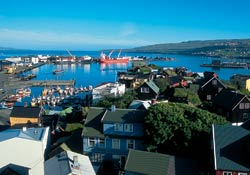
Located in the centre of Torshavn and just a stone's throw from the quay and old town. The roof terrace on top of the hotel offers glorious views across Torshavn and the harbour.
This hotel comprises of 57 rooms, many of which have recently been refurbished, and is perfect for those search for a centrally located hotel, close to local attractions and the tourist office. The airport coach stops directly outside. If you would like a newly refurbished room please let us know at the time of making your enquiry.
Please click on the image for more photos.
A rugged and raw location between the North Atlantic Ocean and the Norwegian Sea. Hiking is one of the biggest reasons for visiting the Faroe Islands, but there are also plenty of other activities and excursions for you to do during your stay.
Walking & Hiking
Visit Faroe Islands Tourist Board have created a brochure detailing many different walks or hikes or varying grades. Feel free to pick and choose your excursion from this online brochure .... http://www.visitfaroeislands.com/en/be-inspired/hiking-in-the-faroe-islands/
Scenic Drives
You don't have to drive too far! A simple map is provided with your rental car. There are no motorways so enjoy the winding roads, mountain views and tiny colourful villages.
Sightseeing and activities in Torshavn
Around the capital there are numerous activities and excursions depending on your personal tastes:
- boat trips to some of the islands (perfect for bird watching)
- guided tours of the old town
- art galleries featuring local artists
- more information at http://visittorshavn.fo/
This holiday is available year round.
Direct flights from Edinburgh are available on Mondays and Fridays. Indirect flights with SAS and Atlantic Airways are available from London and Manchester through Copenhagen on other days.
The flights times are as follows:
Mondays
7.25pm - 8.50pm Edinburgh - Vagar
5.15pm - 6.40pm Vagar - Edinburgh
Fridays
10.10am - 11.35am Edinburgh - Vagar
8am - 9.25am Vagar - Edinburgh
Days of note 2016
3rd June - Culture night in Torshavn.
5th June - Consitution day (public holiday)
28/29 July - St. Olav's Day (public holiday)
Events are subject to change.
Price from
£690 per person for 3 nights
£765 per person for 4 nights
Supplements from
£190 single supplment for 3 nights
£240 single supplment for 4 nights
Price includes
Return flights from the UK to Vagar
3 or 4 nights bed and breakfast at Hotel Hafnia
Some basic information about the Faroe Islands
The Faroe Islands are a small group of 18 main islands located between the North Atlantic Ocean and the Norwegian Sea. There is a population of 50,000 and the capital, Torshavn, has a population of 20,000, which is located 45mins from the airport at Vagar. The highest mountain is Slættaratindur and is 880m above sea level and at no point are you more than 5km (3 miles) from the sea.
History
Life on the Faroe Islands can be traced back to 400AD. The Faroe Islands has been claimed by Norway in the past but has been Danish since 1814. During WWII Great Britain was seen as a friendly invader, designed to counter German manoeuvres in Scandinavia, and maintain a strong position in the Atlantic. The British built the only airport on the islands at Vagar and once the war ended handed sovereignty back to Denmark. In 1948 home rule legislation led to the island becoming a self-governing nation within the Kingdom of Denmark.
Getting to the Faroe Islands
There are direct flights from Edinburgh on Mondays and Fridays with Atlantic Airways. Indirect flights operate from the UK via Copenhagen on other days.
Geography
A geologically interesting area of volcanic rock covering an area of 1400sq km, carved out by the last ice age. The highest point is around 800m and there are 18 main islands. The closest international neighbour is the Scottish Western Isles 260km (160 miles to the south east).
Climate
Located in the North Atlantic Ocean the climate is dominated by the Gulf Stream and the Faroe Islands has little protection from the elements! Their northerly latitude means the Faroe Islands have mild winters with an average temperature of +2C in December and January and cooler summers averaging +13C.
Clothing & Equipment
Depending on your personal holiday plans we recommend good waterproof walking shoes, a rain jacket and some warm clothing. If you are planning on doing some day hikes we recommend a small backpack and a thermos flask for warm drinks. When the sun does shine you will need sunglasses and sun cream as temperatures can reach over +20C during the long, almost endless, summer days. Binoculars and cameras are a must!
Currency
The Faroese Krona and the Danish Krona are of equal value. Danish currency and Faroese currency are both valid. Cards are widely accepted (with the exception of American Express).
Time Zone
The Faroe Islands are always the same as London and 1hr ahead of Copenhagen.
Electricity
A standard 2 pin continental adaptor is required.
Passports & Visas
The Faroe Islands are not part of the Schengen agreement and a passport is required to enter the Faroe Islands. As a general rule, non EU countries require a visa specific to the Faroe Islands. If in doubt please check with your local Danish Embassy.
Driving & Tolls
On the Faroe Islands they drive on the right hand side, just like continental Europe. There are 2 tunnels that each have a 100DKK toll (approx.) to pass through, one as you drive between Torshvan and the airport. There are no pay stations at the tunnels. Please double check the payment process with your car rental company.
Language
Faroese is the main language and most people can speak and write Danish. English is widely spoken, and Icelandic, Norwegian and Swedish and widely understood and spoken.
Alcohol
Bars and restaurants are permitted to sell alcohol for consumption on the premises. There is a state run off licence for the general purchase of alcohol.
Tipping and Service Charges
You are not obliged to tip. Tipping for outstanding service is a matter of choice, but is not expected.
Whaling
Whaling has been a part of Faroese life for centuries and is deeply rooted in the local culture. Pilot whales have provided a vital food source on islands where natural resources are sparse. An estimated 778,000 whales are in the North Eastern Atlantic Ocean, of which approximately 100,000 are around the Faroe Islands.
Whaling is highly regulated and records of whale hunts date back to 1584, the longest running continuous statistics of any use of wildlife. Whale drives are supervised by elected officials and only those with special permits may slaughter the whales. The meat is then distributed, without the exchange of money, amongst the local community.
Whale drives can take place at any time of year when a school of whales is spotted close to shore. Locals gather in small boats and drive the whales ashore to recognised bays. These drives usually take place in July, August and September, when the conditions are more suitable.
The Faroese are aware of the international view on whale hunting but would like the international community to have a better understanding as to why whaling is still carried out. More information can be found here …. http://www.whaling.fo/
Please let us know if something is incorrect or you think we are missing some information from this page.
Welcome to the capital of the Faroe Islands and one of the smallest capital cities in the world, with a population of just 20,000. There are no crowds of people or international department stores; Torshavn is about small locally run businesses where you can buy fresh fish on the quayside or locally produced knitwear to keep you warm.
The literal translation of Torshavn is Thors Harbour (Thor being the Norse god of war) and originates from 900AD. Tinganes is the old town and home to the island's parliament. This ancient area now separates the two harbours and is a popular location for tourists.
There are free busses in the city so exploring is easy! Roads radiate out from Torshavn and the entire Faroe Islands can be explored with help from the efficient public transport network. The tourist office is located in the heart of Torshavn and is the place to locally source all the information you need for your visit.
The highlights of this holiday
The cosy culture of Torshavn, the food at Etika (recognised as one of the best sushi restaurants), the use of public transport to explore the islands (especially during the summer) and the old town and the available water based excursions.
Suggested Itinerary
Day 1
Fly from Edinburgh (direct) to the Faroe Islands.
Self transfer to Hotel Hafnia in Torshavn.
The airport bus operates a frequent service between the airport and Torshavn.
Day 2 to last day
Breakfast.
Day at leisure to enjoy Torshavn or the surroundings.
A range of excursions to choose from.
Last Day
Breakfast.
Self transfer to the airport.
Flight back to the Edinburgh.

Located in the centre of Torshavn and just a stone's throw from the quay and old town. The roof terrace on top of the hotel offers glorious views across Torshavn and the harbour.
This hotel comprises of 57 rooms, many of which have recently been refurbished, and is perfect for those search for a centrally located hotel, close to local attractions and the tourist office. The airport coach stops directly outside. If you would like a newly refurbished room please let us know at the time of making your enquiry.
Please click on the image for more photos.
A rugged and raw location between the North Atlantic Ocean and the Norwegian Sea. Hiking is one of the biggest reasons for visiting the Faroe Islands, but there are also plenty of other activities and excursions for you to do during your stay.
Walking & Hiking
Visit Faroe Islands Tourist Board have created a brochure detailing many different walks or hikes or varying grades. Feel free to pick and choose your excursion from this online brochure .... http://www.visitfaroeislands.com/en/be-inspired/hiking-in-the-faroe-islands/
Scenic Drives
You don't have to drive too far! A simple map is provided with your rental car. There are no motorways so enjoy the winding roads, mountain views and tiny colourful villages.
Sightseeing and activities in Torshavn
Around the capital there are numerous activities and excursions depending on your personal tastes:
- boat trips to some of the islands (perfect for bird watching)
- guided tours of the old town
- art galleries featuring local artists
- more information at http://visittorshavn.fo/
This holiday is available year round.
Direct flights from Edinburgh are available on Mondays and Fridays. Indirect flights with SAS and Atlantic Airways are available from London and Manchester through Copenhagen on other days.
The flights times are as follows:
Mondays
7.25pm - 8.50pm Edinburgh - Vagar
5.15pm - 6.40pm Vagar - Edinburgh
Fridays
10.10am - 11.35am Edinburgh - Vagar
8am - 9.25am Vagar - Edinburgh
Days of note 2016
3rd June - Culture night in Torshavn.
5th June - Consitution day (public holiday)
28/29 July - St. Olav's Day (public holiday)
Events are subject to change.
Price from
£690 per person for 3 nights
£765 per person for 4 nights
Supplements from
£190 single supplment for 3 nights
£240 single supplment for 4 nights
Price includes
Return flights from the UK to Vagar
3 or 4 nights bed and breakfast at Hotel Hafnia
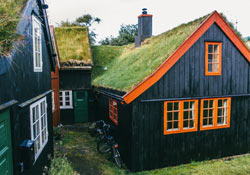
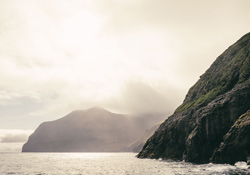

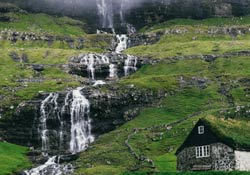
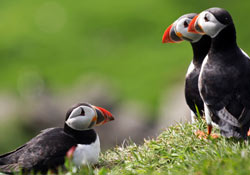
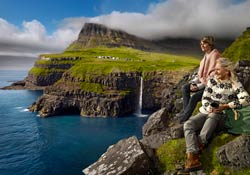
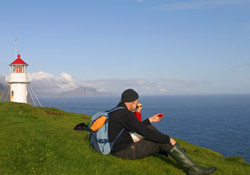

Some basic information about the Faroe Islands
The Faroe Islands are a small group of 18 main islands located between the North Atlantic Ocean and the Norwegian Sea. There is a population of 50,000 and the capital, Torshavn, has a population of 20,000, which is located 45mins from the airport at Vagar. The highest mountain is Slættaratindur and is 880m above sea level and at no point are you more than 5km (3 miles) from the sea.
History
Life on the Faroe Islands can be traced back to 400AD. The Faroe Islands has been claimed by Norway in the past but has been Danish since 1814. During WWII Great Britain was seen as a friendly invader, designed to counter German manoeuvres in Scandinavia, and maintain a strong position in the Atlantic. The British built the only airport on the islands at Vagar and once the war ended handed sovereignty back to Denmark. In 1948 home rule legislation led to the island becoming a self-governing nation within the Kingdom of Denmark.
Getting to the Faroe Islands
There are direct flights from Edinburgh on Mondays and Fridays with Atlantic Airways. Indirect flights operate from the UK via Copenhagen on other days.
Geography
A geologically interesting area of volcanic rock covering an area of 1400sq km, carved out by the last ice age. The highest point is around 800m and there are 18 main islands. The closest international neighbour is the Scottish Western Isles 260km (160 miles to the south east).
Climate
Located in the North Atlantic Ocean the climate is dominated by the Gulf Stream and the Faroe Islands has little protection from the elements! Their northerly latitude means the Faroe Islands have mild winters with an average temperature of +2C in December and January and cooler summers averaging +13C.
Clothing & Equipment
Depending on your personal holiday plans we recommend good waterproof walking shoes, a rain jacket and some warm clothing. If you are planning on doing some day hikes we recommend a small backpack and a thermos flask for warm drinks. When the sun does shine you will need sunglasses and sun cream as temperatures can reach over +20C during the long, almost endless, summer days. Binoculars and cameras are a must!
Currency
The Faroese Krona and the Danish Krona are of equal value. Danish currency and Faroese currency are both valid. Cards are widely accepted (with the exception of American Express).
Time Zone
The Faroe Islands are always the same as London and 1hr ahead of Copenhagen.
Electricity
A standard 2 pin continental adaptor is required.
Passports & Visas
The Faroe Islands are not part of the Schengen agreement and a passport is required to enter the Faroe Islands. As a general rule, non EU countries require a visa specific to the Faroe Islands. If in doubt please check with your local Danish Embassy.
Driving & Tolls
On the Faroe Islands they drive on the right hand side, just like continental Europe. There are 2 tunnels that each have a 100DKK toll (approx.) to pass through, one as you drive between Torshvan and the airport. There are no pay stations at the tunnels. Please double check the payment process with your car rental company.
Language
Faroese is the main language and most people can speak and write Danish. English is widely spoken, and Icelandic, Norwegian and Swedish and widely understood and spoken.
Alcohol
Bars and restaurants are permitted to sell alcohol for consumption on the premises. There is a state run off licence for the general purchase of alcohol.
Tipping and Service Charges
You are not obliged to tip. Tipping for outstanding service is a matter of choice, but is not expected.
Whaling
Whaling has been a part of Faroese life for centuries and is deeply rooted in the local culture. Pilot whales have provided a vital food source on islands where natural resources are sparse. An estimated 778,000 whales are in the North Eastern Atlantic Ocean, of which approximately 100,000 are around the Faroe Islands.
Whaling is highly regulated and records of whale hunts date back to 1584, the longest running continuous statistics of any use of wildlife. Whale drives are supervised by elected officials and only those with special permits may slaughter the whales. The meat is then distributed, without the exchange of money, amongst the local community.
Whale drives can take place at any time of year when a school of whales is spotted close to shore. Locals gather in small boats and drive the whales ashore to recognised bays. These drives usually take place in July, August and September, when the conditions are more suitable.
The Faroese are aware of the international view on whale hunting but would like the international community to have a better understanding as to why whaling is still carried out. More information can be found here …. http://www.whaling.fo/
Please let us know if something is incorrect or you think we are missing some information from this page.